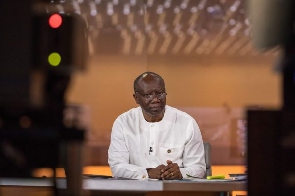 Ken Ofori-Atta is Minister for Finance and Economic Planning
Ken Ofori-Atta is Minister for Finance and Economic Planning
The Institute of Economic Affairs (IEA) has put forward seven policy proposals that it says are key to Ghana achieving immediate recovery and long-term growth.
According to the respected policy think tank, Ghana’s recovery path looks bleak as the coronavirus pandemic hits hard at key sectors of the economy.
The seven policy initiatives IEA has proposed cover areas such as fiscal policy, revenue mobilization, expenditures, monetary policy, natural resource policy, agricultural policy and industry.
Finance Minister Ken Ofori-Atta revealed in April that Ghana will lose more than GH¢9.5 billion due to the impact of the global pandemic on the economy.
Mr. Ofori-Atta, who was speaking in Parliament to brief the nation about the economic impact of the coronavirus pandemic, said the country should prepare to lose more than GH¢9.5 billion from a shortfall in revenue from crude oil exports; non-oil tax revenue; import revenue; and further spending under the National Preparedness and Response Plan and the COVID-19 Alleviation Programme (CAP) to combat the pandemic.
In the 2020 budget, revenue from crude oil was projected with a price of US$62.6 per barrel. However, with Brent crude oil prices taking a nose dive to US$22.9 as of yesterday (March 30, 2020), from US$63.2 in November 2019, government estimates to lose more than GH¢5.6 million, even if the price climb to US$30 per barrel.
To facilitate Ghana’s immediate and long-term recovery, the IEA stated in a press release that detailed the seven economic policy proposals that the country’s revenue mobilization regime would need a facelift.
The IEA notes in the press release that Ghana has a long-standing problem with revenue mobilization, stating that currently, the country's tax revenue/GDP ratio is 12-13%, which compares unfavourably with the average of 25% for middle-income countries and the minimum threshold of 20% under the proposed eco-currency system of the Economic Community of West African States.
“Ghana’s situation of low tax revenues does not arise from the fact that it has low tax rates. On the contrary, Ghana’s personal income, corporate income and VAT rates are relatively high. The problem rather lies with tax losses, which experts estimate to be around 10-12% of GDP. In other words, we lose about as much tax revenue as we collect. Ghana’s tax revenues should be significantly scaled up to support the recovery and long-term growth,” the IEA stated.
IEA, therefore, recommended that tax evasion be tackled head-on.
“Tax evasion is pervasive in Ghana. The act is often perpetrated through connivance between taxpayers and tax officials. The way to deal with the problem is to institute a strict surveillance system backed by a strong sanctions regime for offenders under the aegis of the commercial courts,” the IEA submitted.
The IEA also suggested that fiscal policy must necessarily lead Ghana’s recovery since it is uniquely placed to mobilize and manage the resources required.
“To be able to play this role effectively, persistent rigidities in both revenue and expenditure must be addressed,” the IEA noted.
Read all seven economic policy proposals by the IEA below.